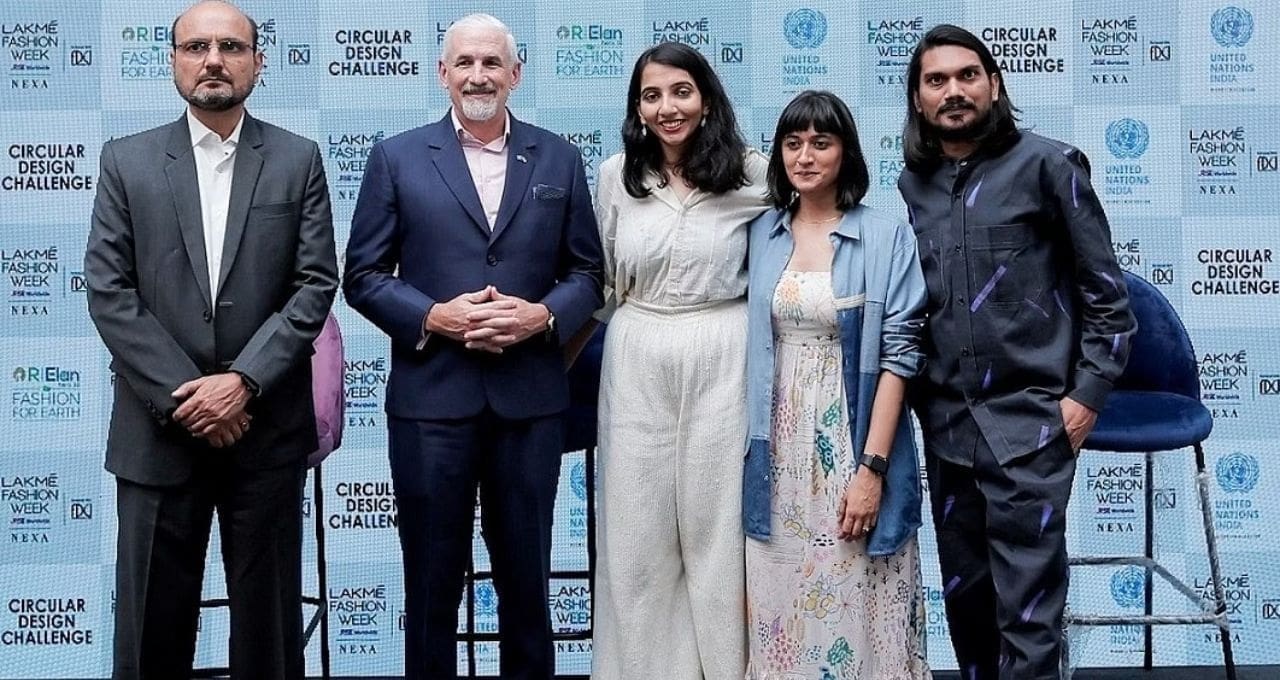In collaboration with FDCI, CDC marked the fifth anniversary of its founding at Lakmé Fashion Week. To commemorate this achievement, three of its alumni, the brands Chamar, Doodlage-Made from Trash, and Iro Iro, presented a special display yesterday.
Circular Design Challenge announced the global extension of its programme beginning with the next season in October 2023 with the goal of increasing its visibility, collaborating with like-minded partners, and attracting creative talent worldwide.
In an effort to attract talent from around the world, the programme will work with international partners such as the British Council for the UK, Berlin Fashion Hub for Germany, and the Redress Award for Hong Kong/Asia Pacific, among others. Those who have been shortlisted will get a chance to present The winner will receive prizes worth INR 20+ Lakh, the CDC Trophy, a six-month mentorship programme, and the opportunity to present a stand-alone showcase at Lakmé Fashion Week in partnership with FDCI in March, 2024. work to an esteemed jury at the October 2023 edition of Lakmé Fashion Week in partnership with FDCI.
In order to realise the goal of our chairman Mr. Mukesh Ambani, to make India a global leader in the adoption of sustainable and green manufacturing practises, we launched the Circular Design Challenge five years ago, according to Mr. Hemant D Sharma, Sector Head – Polyester, Reliance Industries Limited. The popularity of the Circular Design Challenge has skyrocketed during the last five years. In the Indian fashion value chain, it has since become fashionable. This encourages waste reduction in the industry and develops skills in the sustainable and environmentally friendly sector. We are determined to expand this project around the world, encouraged by CDC’s success in India and unprecedented international interest, especially from the top industrialised nations. The “Pyaar” collection, which is frequently seen in cherished goods like a grandfather’s coat, mother’s scarves, father’s sweaters, friend’s T-shirt, or grandmother’s saris, was presented by the “Iro Iro” label by Bhaavya Goenka. It was a testament to love.
The “Pyaar” line of products by “Iro Iro,” which was inspired by this, utilised repurposed materials and exquisite indigenous craft techniques in a variety of colours. They might develop into interchangeable items of clothes, accessories, and perhaps footwear that users in a a kind and compassionate way.
Cute indigo culottes and a boxy cropped long-sleeved jacket caught attention on the runway and are both perfect for cool fun days that linger all day. The meticulously designed long-sleeved, midi shift in indigo and grey featured feminine balloon sleeves and fascinating contrast fabric side seam insets for added drama.
The inspiration also showed the beauty of colour and gradation in the natural world, as well as textures and patterns that demonstrated fashion had followed a more enduring and devoted course.
Accepting Leftovers by CHAMAR
The “Blacking Boot Polish” collection, which was all about animal hides and recycled rubber made from leftover industrial materials, automotive trash, and other abandoned materials, was introduced by Sudheer Rajbhar’s “Chamar” label like a loving hug.
The rubber was key communicator skin, as the collection mobilised the sustainable philosophy that served as the cornerstone of the community engaged in leatherworking processes to produce practical things of daily use like bags, backpacks, and wallets. The designs were functional and classic, allowing the consumer to cherish them for a very long time.
With the “Blacking Boot Polish” line, which has the most popular line of bags on apparel inspired by black boot polish, also known as “blacking,” the “Chamar” label debuted a redesigned appearance.
“We are thrilled that this fashion week emphasised minorities who embrace their first skin and who can pick a second, because true fashion celebrates the beauty of diversity, ” Sudheer Rajbhar continued. Essentially, clothing is about the freedom of self-expression and selecting a different identity. Let’s keep celebrating and lifting up people who go against the grain and redefine what it means to be fashionable.
MADE FROM WASTE DOODLAGE
The “Nostalgia” collection from the “Doodlage” label, created from garbage, was unveiled. It was a memorable, nostalgic trip back to earlier, more environmentally friendly times when upcycling, scarce resources, and hand-me-downs were commonplace. The company took a trip down memory lane to a time when kids were growing up in the 1990s for a look back at fashion.
Dresses, coats, and belted designs were made using recycled materials as well as recovered post-industrial debris. The environmental design was further highlighted by the While the denim was labelled with fabric information, the designs were whimsical floral graphics, which made the clothing stand out.
People are encouraged by Kriti Tula’s “Nostalgia” collection for her “Doodlage” brand to wear their ideals and alter what they want to see and invest in.
After the pandemic, Kriti Tula continued, “We are really thrilled to showcase at Lakmé Fashion Week in conjunction with FDCI. Our efforts to create yet another season-less collection built from garbage are appreciated, and we are pleased to see the presentation get such positive reviews. Everything in the collection was conceptualised using recycled handwoven fabric derived from industry waste and dead stock that we gather from companies.

